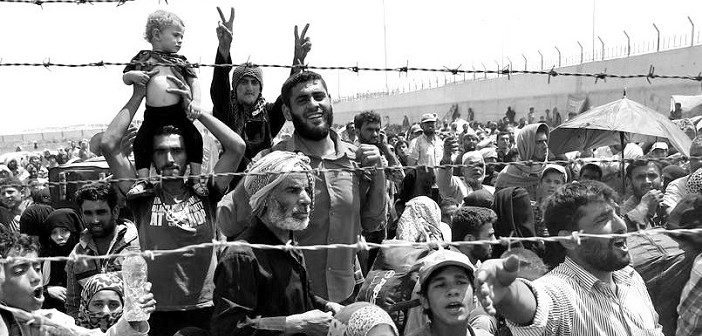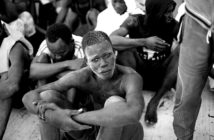I am writing to send a forceful message for the world to hear, a message filled with emotions that compiled after only two months of being back in my beloved home country Lebanon. Having lived an unforgettable student life in Europe, I am now back full of hope and energy in search of a way to help one of the most vulnerable countries in the Middle East today. Yet, why is it so hard to fit back in my own society? Probably because of an inherent rejection of the chaos, whether reported by the media or witnessed in the daily societal life.
بدأ المقال على شكل رسالةٍ أعبّر فيها عن تجربتي الخاصة عند عودتي إلى وطني لبنان. إذ تفاجأت عند وصولي بأزمة النفايات التي أدّت إلى تظاهرات وعرقلة السير وأثّرت سلباً على الحياة اليومية للسكان. ونتجت هذه الأزمة عن رفض النوّاب تمديد عقد شركة سوكلين المسؤولة عن جمع النفايات بحجّة أن الشركة مسيّسة وتعمل على المحاصصات وتقاسم الأرباح. وتضاف إلى هذه الأزمة أزمة اللاجئين السوريين ويشكل عددهم ثلث سكّان البلد. أمّا الانقطاع في التيار الكهربائي والشحّ في المياه المعدنية والتدهور الإقتصادي وارتفاع نسبة المجاعة والفقر فهي ما أدّت إليه هذه الأزمة التي دخلت سنتها الخامسة. والجدير بالذكر أن الدول العربية الثرية ببترولها واقتصادها المزدهر لن تستقبل أياُ من اللاجئين بل ترسل ما يعادل البليون دولاراً لتغطية تكاليف اللاجئين في البلاد المجاورة. لبنان على كفّ عفريت والمجتمع الدولي يأبى تحمّل قسمه من مسؤولية معالجة أزمة اللاجئين. أمّا على الصعيد المحلّي، فهناك غياب لرئيس الجمهورية كما ولنيّة تعيين انتخابات رئاسية فالحكومة الفاسدة باقية كما وغياب القانون الإنتخابي الذي يناسب وجه البلد التعددي.
I arrived in the middle of a garbage crisis, arising from a lack of awareness vis-à-vis the benefits of recycling, the absence of a sound electoral and environmental policy and the greediness of our political elite, who refuses to give a chance to a new generation to reorganize Lebanon according to its visions of a modern and aspiring country.
When the Syrian refugee crisis started in 2011, a considerable influx of refugees transited into our country. At that time, experts predicted the weakening of the Lebanese social and economic structure. Here we are, four years later, the spillover of the Syrian crisis was the cherry on top of a barely functional society: we are living in a quasi- darkness and several regions outside the capital Beirut have less than three hours per day of functioning light. In addition, water is becoming a scarce resource and inflation is on the rise as well as unemployment. Some upper class Lebanese business men and women talk about Lebanese racism and anti-Syrian feeling. This upper class elite, immune to any kind of competition because of their social standing, wealth and education, fail to see how this resentment is emanating from a lower middle class in Lebanese society, a class that feels threatened as it is faced with increasing labor competition.
Regarding youth unemployment, in a seminar held in Beirut in 2014 by the National Council for Scientific Research (NCSR), panellists critically remarked that the industrial sector is plagued by youth unemployment rates of 35 per cent (Justin Salhani, The Daily Star, 6 June 2014). From my personal point of view, being unemployed though recently graduated from a renowned university in Europe, I realize why unemployment is so high today. I recently applied for a position at an institution which is locally and internationally known that matched my educational and professional background. Yet, I was surprised to hear that “candidates are selected according to their ‘wasta or favoritism’not their qualifications”. Hence, favouritism or as we say “Wasta” is more important than any qualification on your CV.
On a more positive note, citizens did express their resentment towards the status quo. As a response to the garbage crisis, a campaign called #youstink was organized by a group of 13 young professionals from different cultural and academic backgrounds to protest against the non-functional government. Concerning the roots of this crisis, it all began when the contract of the main company, Sukleen, mandated to take care of the waste pickup, expired. Sukleen’s work was put on hold for several reasons inter alia for being a politicized company positioned within a deeply divided and corrupt government. The Lebanese political elite thus succeeded in putting the population at risk of serious health diseases, given that the crisis might persist during winter.
The #youstink campaign triggered several other campaigns aimed at paralyzing the government. However, with Lebanon being a sectarian and a deeply divided country, these campaigns where infiltrated by outsiders, predominately from Hezbollah affiliates, in order to spread chaos among participants and security forces.
Yet, this ongoing campaign has several flaws. In order to be successful, it is mandatory to have a clear roadmap set by highly educated politicians who are willing to work for the good of the country, not for the benefit of a certain political party. The roadmap should be a sustainable and viable one. The campaign has to be led by a small group with a defined leadership having a specific goal, which is resolving the garbage crisis and not expending to other policy areas like demanding the withdrawal of the government. The latter, if executed, would destroy the country and hand the power directly to the most powerful constituency today, which is Hezbollah. Besides, the country is facing a presidency vacuum since the president term ended on the 25th of May 2014.
In fact, since the withdrawal of Syrian troops in 2005, Lebanon has been unable to organize regular and independent presidential elections due to heavy regional influence from Iran and Saudi Arabia (The National World, One year on, still no president for Lebanon). According to Sahar Atrash, analyst at the International Crisis Group, “the regional sponsors are waging direct wars and proxy wars and the regional issues are much bigger than meeting to elect a president for Lebanon”. Hence, a presidential election is not on the regional list of priorities, especially with the on-going Syrian crisis.
Overall, we are heading towards a complete destruction of the country, the social needs are far from being fulfilled, our health is at stake and with the current turmoil in the Middle East a presidential election is inexistent. It is to be noted that if we had a head of state, none of these protests would have taken place because he would be the solution for many ongoing problems. After the election of a new government, the president would agree together with the national government on a new electoral law that is compatible with the pluralistic face of the country. This would give effect to the Lebanese Constitution and calm the population’s rage which is leading to daily protests and road blocks in downtown Beirut.
There are several possible solutions that would potentially help the country out of its current stalemate. First and foremost, the Syrian crisis being an international conflict, the UN Security Council is mandated to take into account the capacity and level of resilience of each affected country and make sure that the spill-over effect is not going to destabilize the region. Yet, the opposite happened as we have witnessed in the case of Lebanon, where refugees are more than a quarter of its population. The country has so far experienced an increase of 25 per cent of inhabitants.
With the Syrian refugee crisis hitting Europe, questions have been raised over why they are not heading to the wealthy Gulf States closer to home. The reason is that the Syrians are “required to obtain rarely granted visas to enter almost all Arab countries” (BBC News, Amira Fathalla, Migrant Crisis: Why Syrians do not flee to Gulf States?).
Furthermore, the largest Arab country, “Saudi Arabia, like all the Gulf States, is not a signatory to the UN refugee convention, so these displaced people are not officially designated as refugees”(Bloomberg, Leonid Bershidsky, Why don’t Gulf States accept more refugees?). The Gulf countries have decided to take zero refugees but are willing to “compensate” by donating around 1 billion dollars to the hosting countries because they believe, according to an interview held by BBC with the Emir of Qatar, that they have already “plenty of slaves” (Fox Crawl, Emir of Qatar about hosting Syrian Refugees).
Unfortunately, we have reached the point of no return.
Major decisions have to be taken, whether nationally related to the Lebanese presidential elections and governmental reforms, or internationally in order to balance the weight of the Syrian refugee crisis.





